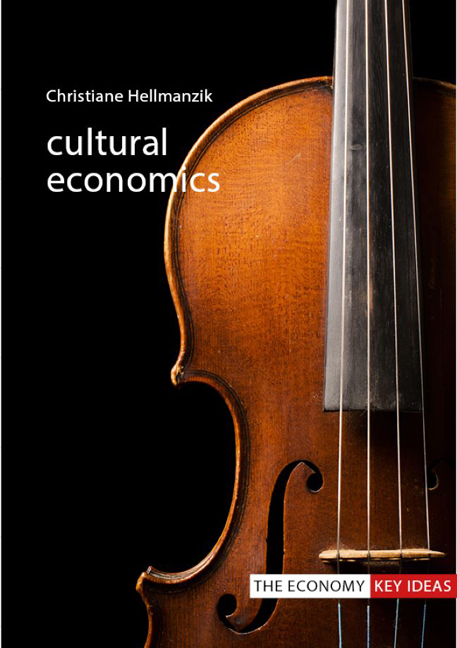Book contents
- Frontmatter
- Contents
- Acknowledgements
- 1 Introducing cultural economics
- 2 Markets, prices and agents
- 3 Society and culture: public provision and institutional aspects
- 4 Demand for culture
- 5 Artists, superstars and creativity
- 6 Quality in the arts and culture
- 7 The organization of cultural industries
- 8 The internet’s impact on cultural sectors
- 9 Globalization’s impact on cultural sectors
- 10 Conclusion
- References
- Index
4 - Demand for culture
Published online by Cambridge University Press: 20 December 2023
- Frontmatter
- Contents
- Acknowledgements
- 1 Introducing cultural economics
- 2 Markets, prices and agents
- 3 Society and culture: public provision and institutional aspects
- 4 Demand for culture
- 5 Artists, superstars and creativity
- 6 Quality in the arts and culture
- 7 The organization of cultural industries
- 8 The internet’s impact on cultural sectors
- 9 Globalization’s impact on cultural sectors
- 10 Conclusion
- References
- Index
Summary
What characterizes the demand for culture? On the one hand, it encompasses the concept of willingness to pay, which we have introduced earlier as the key ingredient behind the demand curve. On the other, it includes preferences for the consumption of cultural goods. To this end, we will explore the economic theory of demand and other motivations for consuming art, such as investment considerations and the social factors that might make us more inclined to consume cultural products.
When thinking of consumers in economics, we almost always rely on assumptions about why we go out and spend our money on movies, plays and books the way we do. It is no secret that economists rely on the concept of homo economicus, namely that consumers make rational consumption decisions to maximize their utility with the money they have available to spend. In other words, the only decisions that rational consumers make are ones that will make them better off. Of course, we can disagree with this concept, especially when applying it to the realm of culture, where we often go way beyond the mere fulfilment of physical needs such as hunger or thirst.
In these simple, mechanical consumption decisions – I am hungry, so I buy an apple – we might go with more or less rational decision making by consumers. However, when it comes to art, it seems obvious that tastes play a much stronger role than in other product categories. By binge-watching box sets or pressing the repeat button on your favourite song, it is evident that the consumption of culture is a different animal. Nonetheless, the key features of a limited budget in terms of time and money are still applicable even to the most diehard Suits fan. Moreover, some sensitivity to price is still prevalent even if we are diehard fans.
Preferences
To start with the fact that each of our preferences are a given, we might not necessarily be able to capture them in their entirety; however, we reveal our preferences in the market by our decisions and actions.
- Type
- Chapter
- Information
- Cultural Economics , pp. 43 - 56Publisher: Agenda PublishingPrint publication year: 2020



